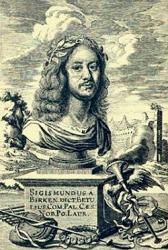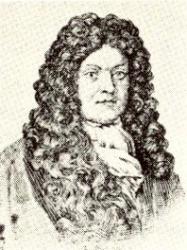
1601 - 1673 Hymnal Number: 386 Author of "O Tod, wo ist dein Stachel nun?" in Das Kleine Davidische Psalterspiel der Kinder Zions Gesenius, Justus, D.D., son of Joachim Gesenius, pastor at Esbeck, near Lauenstein, Hannover; was born at Esbeck, July 6, 1601. He studied at the Universities of Helmstedt and Jena, graduating M.A at Jena in 1628. In 1629 he became pastor of St. Magnus's Church, Brunswick; in 1636 court chaplain and preacher at the Cathedral in Hildesheim; and in 1642 chief court preacher, consistorialrath, and general superintendent at Hannover. He died at Hannover, Sept. 18, 1673 (Koch, iii 230-237; Allgemeine Deutsche Biographie, ix. 87-88; Bode, p. 76, &c).
Gesenius was an accomplished and influential theologian, a famous preacher, and distinguished himself by his efforts to further the catechetical instruction of the children of his district. Along with D. Denicke (q.v.) he edited the Hannoverian hymnbooks of 1646-1660. Both he and Denicke aimed at reducing the older German hymns to correctness of style according to the poetical canons of Martin Opitz; not so much interfering with the theology or making the authors speak a terminology foreign to them. Consequently their recasts, while setting a bad example, and while often destroying much of the force and freshness of the originals, were not by any means so objectionable as the recasts of the Rationalistic period, and moreover were soon widely accepted.
As no authors' names are given in the Hannoverian hymnbooks, it is difficult to assign the authorship of the new hymns and recasts therein contained. The following is generally, and apparently with reason, ascribed to Gesenius:
Wenn meine Sünd' mich kränken. Passiontide. His finest hymn as regards depth, warmth, and finish. First published in the Hannover Gesang-Buch 1646, No. 49, in 8 stanzas of 7 lines. It has been called a recast of the hymn "Hilf Gott, dass mir gelinge," but bears not the slightest resemblance to it. Included in Crüger's Praxis, 1656, and many later collections, as the Berlin Geistliche Lieder S., ed. 1863, No. 277. By a not unjust retribution it was soon recast, and appeared in the Lüneburg Gesang-Buch, 1661, as "Wenn mich die Sunden kränken." Translated as:—
1. When guilt and shame are raising. In full, by J. C. Jacobi, in pt. ii., 1725, of his Psalter Germanica, p. 4 (1732, p. 34). In the Moravian HymnBook of 1789, No. 106, it is altered to “O Lord, when condemnation"; and in the edition 1886, it begins with st. v., "Lord, let Thy bitter passion." A cento of stanzas ii., iii., v., from the Moravian Hymn Book, 1801, was adopted by Montgomery in his Christian Psalmist, 1825, beginning, "O wonder far exceeding," and this is in the New Zealand Hymnal. 1872.
2. 0 Lord, when my sins grieve me. A good translation of stanzas i., ii., iv., v., by A. T. Russell, as No. 81 in his Psalms & Hymns, 1851.
3. When sorrow and remorse. In full, by Miss Winkworth in her Lyra Germanica, 1st Ser., 1855, p. 74. A cento consisting of lines 1-4 of stanzas i., iv.—vi., and of stanza vii., rewritten to S.M., is in the Pennsylvanian Lutheran Church Book, 1868.
4. 0 Lord, when condemnation. A full and good translation, included as No. 84 in the 1857 ed. of Mercer's The Church Psalter and Hymnbook. Probably by Mr. Mercer, but mainly taken from the Moravian Hymnbook, 1789, and from Miss Winkworth. Repeated, abridged, in his Oxford ed., 1864, No. 149, and in the Toronto HymnBook, 1862.
5. When o'er my sins I sorrow. A good translation, based on her 1855 version, and omitting stanzas ii.—iv., by Miss Winkworth, as No. 48 in her Chorale Book for England, 1863. [Rev. James Mearns, M.A.]
-- John Julian, Dictionary of Hymnology (1907)
Justus Gesenius


